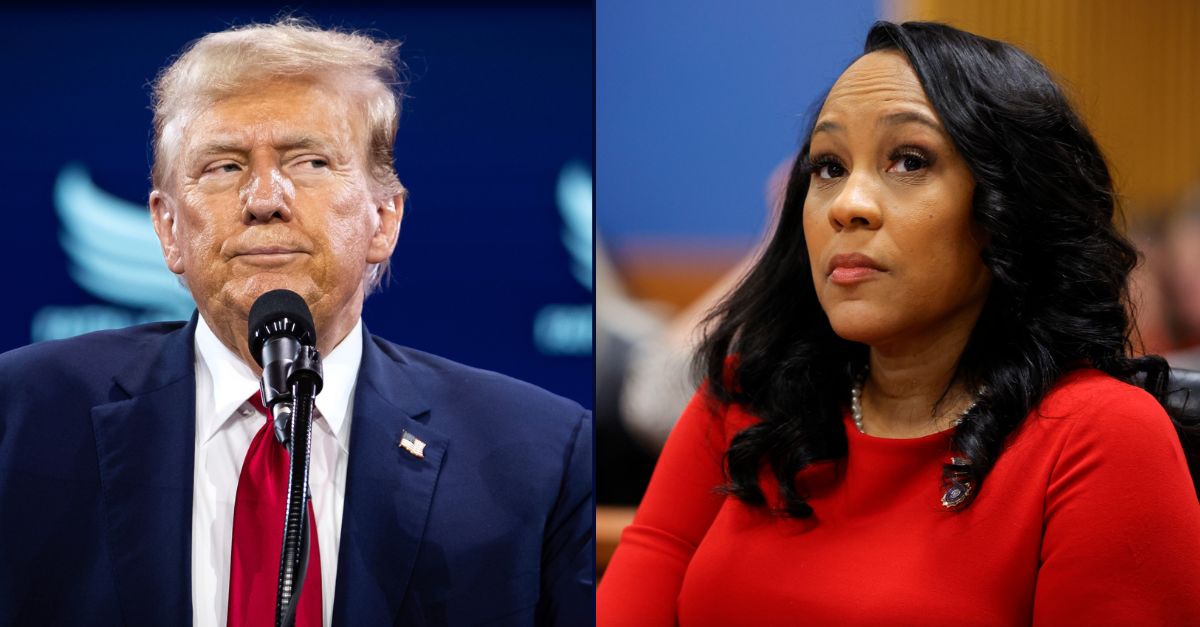
Left: Donald Trump speaks at the annual Road to Majority conference in Washington, DC, June 22, 2024 (Photo by Allison Bailey/NurPhoto via AP). Right: Fulton County District Attorney Fani Willis arrives during a hearing on the Georgia election interference case, Friday, March, 1, 2024, in Atlanta (AP Photo/Alex Slitz, Pool).
A judge in Georgia has ruled that Republican state lawmakers have the “undisputed” authority to subpoena Fulton County District Attorney Fani Willis regarding allegations of wrongdoing in connection with her investigation and prosecution of Donald Trump on allegations of interfering in the 2020 presidential election.
Fulton County Superior Judge Shukura Ingram on Monday ordered Willis to file a response with the court putting forth any arguments regarding specific materials being sought by the Georgia State Senate’s Special Committee on Investigations subpoenas that involve confidential or privileged information by Jan. 13, 2025, according to a report from The Associated Press.
In the order, Ingram reportedly highlighted that the Senate committee demanding the information from Willis had already told the prosecutor they were willing to seek a narrower scope of documents.
“Petitioner claims that the subpoenas are overbroad and seek privileged and/or confidential information,” Ingram wrote. “This may very well be true, but this Court needs more details on the basis for these objections from Petitioner before ruling on Respondents’ application for enforcement.”
The Senate committee — which was formed for the express purpose of looking into “various forms of misconduct” in Willis’ prosecution of the former president — initially issued two subpoenas to Willis in August seeking myriad documents as well as in-person testimony from the embattled district attorney regarding her prosecution of the president-elect as well as her romantic relationship with Nathan Wade, whom she appointed as special prosecutor in the case against Trump and several of his allies.
The committee’s resolution said that Willis’ relationship with Wade created a “clear conflict of interest and a fraud upon the taxpayers,” per the AP.
Willis responded to the subpoenas by arguing that the requests were invalid because the committee did not have the power to issue subpoenas after the end of the legislature’s regular session, sought information that did not have a connection to any legitimate legislative need, and was unconstitutional in light of the state’s separation of powers doctrine.
But Ingram on Monday ultimately rejected those arguments.
“It is undisputed that the General Assembly has the unenumerated and implied constitutional power to conduct investigations and the statutory authority to issue subpoenas for the purposes of such investigations,” she said, per the Atlanta Journal-Constitution. “Here, the Senate, as a chamber, empowered itself to issue subpoenas, which it was authorized to do.”
Former Georgia Gov. Roy Barnes, a Democrat who is representing Willis in the matter against the Senate committee, told the AP he believes Ingram’s ruling was “wrong” and will seek to have it overturned on appeal.
Ingram’s ruling was the latest in a series of high-profile legal losses for Willis, who last week was removed from the Trump case by the Georgia Court of Appeals.
Trump and his 18 co-defendants had been angling to have Willis and her office removed from the case since January — initially over allegations that her romantic relationship with Wade created a conflict of interest due to pecuniary motives.
A three-judge panel on the appeals court agreed in a 2-1 ruling, holding that the trial court erred in allowing Willis and her office to remain on the case after concluding that her relationship with Wade resulted in the “significant appearance of impropriety.”
“After carefully considering the trial court’s findings in its order, we conclude that it erred by failing to disqualify DA Willis and her office,” Judge Trenton Brown wrote in the majority opinion that was joined by Judge Todd Markle.
The case out of Fulton County centers on accusations that Trump and 18 others conspired to overturn his 2020 election loss in the Peach State. The indictment alleged actions such as then-President Trump beseeching then-Georgia Secretary of State Brad Raffensperger to “find” enough votes so that Trump would carry the battleground state and also trying to get Republican state lawmakers to appoint a different slate of college electors that would vote in Trump’s favor.
After the relationship between Willis and Wade came to light, several of the defendants filed court documents seeking to have Wade, Willis, and her office disqualified from the case.
Fulton County Superior Court Judge Scott McAfee in March partially granted the request, ordering that either Wade or Willis had to be removed, but not both, despite finding that a reasonable person could think Willis was “not exercising her independent professional judgment totally free of any compromising influences.”
The defendants were granted an immediate appeal of McAfee’s ruling and the appellate panel agreed that the trial court’s solution to the problem was inadequate and “did not cure the already existing appearance of impropriety and the ‘odor of mendacity.””
“The remedy crafted by the trial court to prevent an ongoing appearance of impropriety did nothing to address the appearance of impropriety that existed at times when DA Willis was exercising her broad pretrial discretion about who to prosecute and what charges to bring,” the appellate court wrote. “While we recognize that an appearance of impropriety generally is not enough to support disqualification, this is the rare case in which disqualification is mandated and no other remedy will suffice to restore public confidence in the integrity of these proceedings.”
Willis and her office were “wholly disqualified” from the case but the panel ultimately rejected a request from the defendants seeking to have the indictment dismissed. Willis is appealing the decision.






